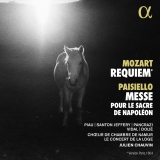Vieles an dieser Aufnahme mit dem Choeur de Chambre de Namur kann gefallen. Die Interpretationen sind generell schön ausbalanciert. So geht Julien Chauvin bei Mozarts Requiem nicht in die Extreme wie vielleicht andere Interpreten. Beispielhaft sei hier das Confutatis genannt, das nie überspitzt formuliert wird. Dem entspricht auch der etwas opulentere Gesamtklang, der allerdings ein gesangliches Glanzstück wie die meisterhaft dargebotene Schlussfuge nicht unterbindet.
Auch in der Paisiellio-Messe gibt es eine feine Balance zwischen den Soloparts und den Chorpassagen. Das Orchester und das Sängerensemble musizieren expressiv, engagiert. Leider ist der Klang stellenweise sehr hallig, und im Gesamtbild verschwimmen viele Einzelheiten.
Am Ende bleibt diese Aufnahme für uns dennoch eine Kuriosität mit französischen Eigentümlichkeiten – beginnend mit der französischen Aussprache des Lateinischen – vor allem die Umlautung bei den U-Endungen, die nerven und auch karikierend wirken.
Dann stellt sich die Frage, ob man diese Pariser Fassung des Mozart-Requiems überhaupt braucht? Das Introitus gibt es gleich zweimal (von Jommelli und von Mozart), dafür hat man dann das Kyrie übersprungen.
Einen ähnlichen Kunstkniff haben wir in der Paisiello-Messe, wo vor dem Incarnatus, mit Harfen- und Horn-Einleitung, ein sinnfreies Harfen-Präludium den musikalischen Fluss unterbricht.
Das mag dem Zeitgeist entsprochen haben, und die interessante Einführung im Booklet setzt die Werke in ihren Kontext. Dennoch – als Kuriosität ist diese Produktion gut, für das Mozart-Requiem jedoch setzen wir definitiv auf andere Interpretationen.
There is much to like about this recording with the Choeur de Chambre de Namur. The interpretations are generally nicely balanced. For example, Julien Chauvin does not go to extremes in Mozart’s Requiem as perhaps other performers do. One example is the Confutatis, which is never overstated. This also corresponds to the somewhat more opulent overall sound, which, however, does not prevent a vocal highlight such as the masterfully performed final fugue.
In the Paisiellio Mass, too, there is a fine balance between the solo parts and the choral passages. The orchestra and the ensemble of singers make expressive, committed music. Unfortunately, the sound is very reverberant in places, and many details blur in the overall picture.
In the end, this recording nevertheless remains for us a curiosity with French peculiarities – beginning with the French pronunciation of Latin – especially the umlautization in the U endings, which are annoying and also somehow sound like a caricature.
Then the question arises whether one needs this Paris version of the Mozart Requiem at all? The Introit exists twice (by Jommelli and by Mozart), but the Kyrie was skipped.
We have a similar thing in the Paisiello Mass, where before the Incarnatus, with harp and horn introduction, a meaningless harp prelude interrupts the musical flow.
This may have been in keeping with the spirit of the times, and the interesting introduction in the booklet puts the works in their context. Still – as a curiosity this production is good, but for the Mozart Requiem we definitely go for other interpretations.
























